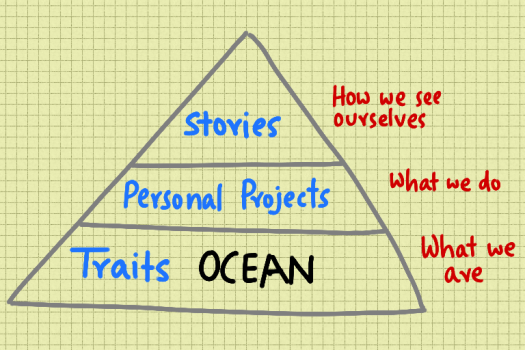
The answer we give to a question like "How are you?" or "How's it going" depends on how we're feeling at the time.
But - why do we feel the way we do at a given time?
The field of personality psychology tries to explain that.
It appears that there are three levels at which personality can be explored - corresponding to Dan McAdam's three level model of personality.
At the foundation of our personality are traits.
Our general tendencies, or disposition, is based on traits that can help describe our personality.
For example, the Big Five personality traits are Openness, Conscientiousness, Extraversion, Agreeableness and Neuroticism, remembered with the mnemonic OCEAN.
These traits describe characteristics such as being open to new experiences, how organized and dependable we might be, whether we are energetic in the presence of others, whether we are compassionate and trusting rather than suspicious and how easily we experience unpleasant emotions such as anger.
While traits might describe what we are - they don't explain why we are what we are - because we are more than just traits.
One level up is what we do with our lives - the things we do day to day - something called a Personal Action Construct (PAC).
The PAC is a model we have in our heads about the facts of our life and the order in which we put them.
A specific PAC developed by the psychologist Brian Little is the Personal Project. Brian explains his ideas in his book Me, Myself and Us and an entertaining TED talk.
In his approach, Personal Projects comprise things like "personal strivings, life tasks, personal goals, current concerns and possible selves".
Brian argues that Personal Projects can explain a lot about why people act the way they do. If we can understand someone else's projects that can help us understand and work with them better.
At the same time, if the projects we have are ones that are tiring and stressful or not aligned with our traits and sense of purpose, it's not surprising that we aren't that happy.
At the top of the hierarchy are stories - what we tell others to make sense of our own lives so far and what we want to do in the future.
Stories are important - without a coherent narrative it's hard for us or anyone else to understand our position.
Whether we're looking for investment for a new company, trying to change jobs, or create a new product or service or figure out what to about responsibilities when getting older - the stories frame and tell will steer the actions we take.
The point about this 3 level model is that all of this happens without most of us being remotely aware of it - who thinks about their personality in terms traits, projects and stories?
The level to focus on, however, might be the second one - Personal Projects.
Traits are inbuilt. Stories are after the event. The projects are the here and now.
As John Ruskin wrote, "Tell me what you like and I'll tell you what you are"
Read more posts at Karthik-Suresh.com or connect with me on LinkedIn.
Good writing. I think the basis of this theory is rooted from Freud's conception of Human Psyche. Below is a visual to summarize the concept.

Thank you for sharing.
FD
Downvoting a post can decrease pending rewards and make it less visible. Common reasons:
Submit
Thanks FD. Appreciate the feedback and visual.
Downvoting a post can decrease pending rewards and make it less visible. Common reasons:
Submit